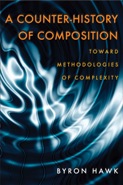A Counter-History of Composition: Toward Methodologies of Complexity
by Byron Hawk
U of Pittsburgh P, 2007, ISBN-10: 0-8229-5973-1
Reviewed by Wesley Venus, University of Georgia
| Summary | Discussion | Applicability | Pedagogy | Hopes/Desires | Conclusion(s) | Assessment | References | Notes |
Applicability |
|
 | Hawk juxtaposes this notion of ecological potential alongside the fast-moving changes of society's contemporary technological and material conditions. New Media theorists have long noted the advantages of living in a culture where the rate of technological progress outstrips an individual's comprehension of it: unlike in most other periods, subjects more readily perceive the relation between their material conditions and their individual psyches. But this new ecology exists as both a blessing and a curse, ironically perhaps, in the same sense as the rhetorical context always has, regardless of the particulars. In every case, a subject's position and function in the larger scheme is at stake, and the risk is of cutting him or herself off from the vitalistic source. Writers should guard against thinking once again of their subject-positions as launching places for poorly-informed acts of self-assertion. This means thinking of action and craft in ways that are other than rationally reducible. Chapter Five: Technology-Complexity-Methodology Technê, Hawk observes, is not so harmful, so long as instrumentalism is paired with bodily ecology (p. 168), so long as it is understood that "the human being in the contemporary digital world is not reduced to exerting human will through technology"; rather, "it is not about intervening through technology but about dwelling with/in technology, with/in a culture that is intimately intertwined with technology in multiple, complex ways" (p. 175).[17] Here he drives at the heart of the role of technology in relation to composition studies, as his point asks readers to carefully consider what their writing goals are and whether or not they are thinking of ease and efficiency or of subject-transformation.[18] In response to the human sense of separability from environment, Hawk envisions language users existing in a nodal environment rather than a dialectical one and that scholars and teachers abandon any hope for full conceptualization of a rhetorical context. Such a gesture would enable writers to embrace their subject-positions in a more complex way, and in so doing suppose a subjectivity where the self—its reasoning, its ethics, and its feeling—exists as a function of a relational network logic that is both complex and adaptive. Further, the terministic screen emerges in such a circumstance for the self—indeed, the notion of self—as a set of adaptive mechanisms "to negotiate the surrounding environment" and in essence, "generate knowledge" (p. 188). Recalling Coleridge's notion of the secondary imagination and fancy, his ideas about subject-identity are visible in a more contemporary light; adaptive mechanisms like the terministic screen help a writer to manage his or her sense of things, which is of particular note in an era where the role of new technology is not so clear. The question arises, then, of how nodal networking and complex ecology affect invention and composition pedagogy, and Hawk's answer is connected more to when and to where than it is to how, which has been the traditional way of things. Heuristics have always been connected to the creation of meaning through language, but a heuristic fails in its universal applicability when it is not made to be fundamentally adaptive. Hawk points to various heuristics taken to be standard and demonstrates that each supposes itself to be utterly adaptive to any topic, only to be undermined (and often scapegoated) in later theoretical contexts. The most recent example to which Hawk directs his focus Berlin's social-epistemic heuristic (pp. 195-99), which has been useful in identifying problem areas, but is ultimately situated in a predetermined politics. Critique is possible, in this case, but the construction of counter-myths is not. Hawk proposes a heuristic that embraces both individual and global complexity and does not suppose that the myths of one can map onto the myths of the other. Mapping would occur, instead, in the act rather than before it, and one would create new relations (as Coleridge's secondary imagination does) rather than signify (p. 200).
|